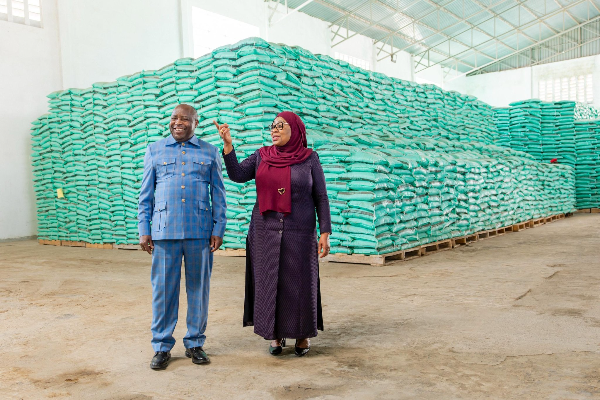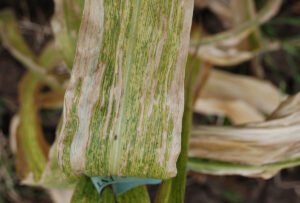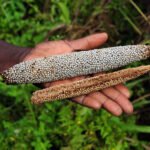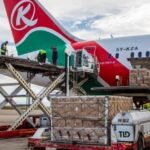By Zablon Oyugi July 15, 2025 – Tanzania has opened its largest fertiliser production facility—the ITRACOM Fertiliser Factory—marking a major milestone in the country’s push for agricultural transformation and regional food security.
The inauguration ceremony was presided over by President Samia Suluhu Hassan and Burundi’s President Évariste Ndayishimiye late last month at the plant’s location in the Nala Industrial Area on the outskirts of Dodoma.
Constructed at a cost of approximately $180 million, ITRACOM factory boasts an annual production capacity of one million tonnes, with plans to scale up to 1.2 million tonnes in 2026. The facility has already created 1,805 direct jobs and is expected to employ up to 3,000 people directly, with additional thousands of indirect employment opportunities anticipated.
“This is more than just a factory; it is a solution to one of the biggest challenges facing our farmers,” said President Samia. She emphasized the importance of the plant in reducing dependence on imported fertiliser, boosting agricultural productivity, promoting regional trade, and improving farmer incomes.
Agriculture remains central to Tanzania’s economy, contributing 30% of GDP, 60% of industrial raw materials, and employing 70% of the population. However, limited access and high import costs have historically constrained fertiliser use. The new facility—manufacturing organo-mineral fertilisers under the FOMI brand—aims to increase usage through local, cost-effective supply.
Burundian President Ndayishimiye praised the factory’s contribution to regional cooperation and economic development. Noting that ITRACOM owner Adriano Ntigacika was once a refugee in Tanzania, he commended the country for its hospitality and support. “Every mouth should have food and every pocket should have money,” he said, emphasizing the importance of such investments in advancing food and income security.
According to ITRACOM CEO Nduwimana Nazer, the Dodoma plant is among the largest organo-mineral fertiliser production facilities in East Africa. It is also equipped to produce 100,000 tonnes of agricultural lime per year, essential for improving acidic soils and boosting yields.
Government support has played a crucial role in bringing the project to life. Under President Samia’s administration, Tanzania’s agriculture budget has grown significantly—from TZS 294 billion in 2021 to TZS 1.24 trillion in 2025. Fertiliser subsidies have surpassed TZS 600 billion over four years, alongside expanded programs for soil testing, irrigation infrastructure, and improved seed access.
Agriculture Minister Hussein Bashe noted that with current momentum, Tanzania could fully meet its national fertiliser demand—estimated at 2.1 million tonnes annually—by 2030.
The favourable investment climate has also attracted regional and international interest. Incentives such as land allocations, tax exemptions, infrastructure support, and regulatory facilitation have been key. Institutions like the Tanzania Investment Centre, Tanzania Fertilizer Regulatory Authority (TFRA), and Tanzania Petroleum Development Corporation (TPDC) are collaborating with global investors including Indonesia’s Essay Group. Notably, a large-scale ammonia-to-urea plant is planned for completion by 2029.
Strategically located in central Dodoma, the ITRACOM factory benefits from proximity to major transport infrastructure, including the Standard Gauge Railway and the soon-to-be-opened Msalato International Airport. These links position the plant to serve not only domestic markets but also neighbouring countries across East and Central Africa.
The factory’s use of local inputs has further stimulated rural economies. Tanzanian livestock farmers have supplied nearly 100,000 tonnes of manure—valued at TZS 15 billion—for fertiliser production.
Looking ahead, Tanzania continues to expand its fertiliser production ecosystem. Minjingu Mines & Fertiliser has increased its output from 100,000 to 250,000 tonnes, and a natural-gas-powered urea plant is under development to bolster domestic supply.
The inauguration of the ITRACOM Fertiliser Factory marks a pivotal shift in Tanzania’s agricultural landscape—from reliance on imported inputs to local manufacturing leadership. It is a critical step toward greater productivity, enhanced food security, and stronger regional trade.







